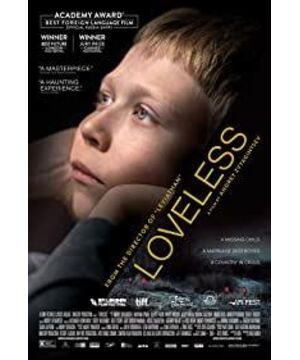(Text / Yang Shiyang)
Like the gloomy and majestic "Leviathan", director Sagintsev's "No Love to Tell" is equally cold and gloomy, everything is lonely, and people's hearts are dry. This story about the collapse of family and love has always been In such a context, progress slowly. It not only tells about a divided family and a lost child, but more, it involves the cliff and collapse of beliefs, from within a family, to the bottom of everyone's heart, and then to a huge social base.
The hero and heroine are in the same room, either falling into awkward silence or endless abuse. Behind the couple who are going through a divorce, there is a boy who is suffocated by ill-will. One day, the boy suddenly disappeared, and the family began to inspect, but it was unsuccessful. . Everything that was pending finally fell apart, but the new life that finally arrived was not clear. All the suspense of this story is tied to that search, but in the end there is no clear answer.
Following the typical practice of "Leviathan" in which a small thing is implanted into a grand social and political environment, Sarkinsev tries to use a breakdown of emotional and private relationships to reflect the tearing of a society and the breakdown of internal spirituality. To be honest, the relationship between "event" and "environment" in the previous work will be much closer than that of "No Love to Complain". And those social and political contents in "No Love to Sue" are more like long-term, floating, hidden, and ubiquitous perpetrators, all of which do not directly inspire anything, but the long-term infiltration and corrosion are more Deadly, think about it carefully, do these environments create the freezing of human hearts, or do dead human hearts create a cold reality? From this point of view, this story is more about the loss of soul and blood of human heart.
The wife hates the husband, the husband hates the wife, the parents alienate their children, and they seem to feel that their present life is the result of a mistake and try to find it again, the man finds a young woman, the woman finds a middle-aged woman who thinks she loves her Men, the story is advancing in parallel, both parties are looking for fun, and each is tired. But in fact, everything is replicating the way they lived before, the same detached cracks, the same slowly expanding holes. The story has a unique narration that blatantly depicts what is happening in the new life as a re-enactment and re-enactment of the old, the couple's past of grumbling and remorse in their quarrel, but all of it is revived in the new relationship. As a new kind of salvation, even though they have experienced a heart-wrenching heartbreak, they are still stupid and ignorant. The theme of this story has become clearer and clearer, that is, "no salvation".
Their lives have thus entered an unbreakable cycle of death, and they all tried to restart, but they were ultimately ineffective and could not have the ability to love. Even if they had sex, flirtation and expectations with the newcomer, they eventually fell into the established situation. trail of. The heart is frostbitten by the extreme cold, just like those trees overgrown with dead branches and the cold lake in the film. They once talked about the child in the quarrel, "If it was abolished at the beginning, it would be good for everyone." Later, the child "killed" himself, self-exiled, self-expelled, and self-disappeared - from a loveless family. middle. But nothing has changed.
There are too many familiar shadows in "No Love to Tell", the cold violence in the family, the abandonment of ethics, the delusion and burnout in the external environment. This movie is full of acting, heart-fighting and all sorts of scheming tricks, men are careful to hide the fact that their marriage is broken in the office, just because the boss claims he is a devout believer, losing the marriage may lead to losing the job, but the boss is Absent, all this has never been confirmed, and everyone is silently sending this message, reinforcing each other, women go to beauty salons and high-end restaurants all day long, using the remaining beauty and condescension in exchange for a little life capital, and paint everything. Put on the rhetoric of love. People all try to decorate the facade of life with something, completely ignoring that the inside is completely rotten.
From the beginning of the film, the film consciously explained a transition between the old and the new - the house was put up for sale, the loving new couple came to see the house, and the bad old couple quarreled in the living room at night. A page is about to be turned, ushering in a new page. Then, the man and the new love are shopping in the supermarket, lingering on the bed, the woman and the man are staring at each other in the restaurant, teasing each other, and they are all on their way to a new life - a kind of self-righteous new life about to be redeemed, only the child, being brutalized Stuck, or rather, being forgotten in the old world, alone resisting some unexplained tragedy that fell on him inexplicably. The missing child did not have any decent lines from beginning to end. He left a lonely farewell with his partner, a silent cry, a back view of playing alone, and finally disappeared from life. This behavior is neat for life. Sentencing, even in the end, the two adults did not understand the verdict of life and fate for them.
Compared with the superficial and individualized interpretation of irresponsible mothers and scumbag fathers, this repeated, hopeless repetition of life is the root of the coldness of this story. Houses are sold, walls stripped, redecorated, lives reset, one family takes over from another, one trace over another. The old house moved into the new man, and the old man also settled in a new home. The dust and routine of the new life began to accumulate little by little, and it was suffocating again. The man held the newly born child aside in disgust, would these new thorns and blades forged by the cold make the baby the second lost boy?
View more about Loveless reviews









